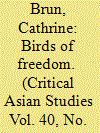|
|
|
Sort Order |
|
|
|
Items / Page
|
|
|
|
|
|
|
| Srl | Item |
| 1 |
ID:
111512


|
|
|
|
|
| Publication |
2012.
|
| Summary/Abstract |
In May 2009, Sri Lankan government armed forces defeated the Liberation Tigers of Tamil Eelam (LTTE) after more than a quarter of a century of civil war. With the elimination of most of the LTTE leadership and the waning of its hold over Tamils in Sri Lanka and abroad, the scene was set for a transformation of relations between the diaspora and those at home. It is the dynamics of this transformation that we explore in this article, which traces the shifting centre of gravity in Tamil politics between actors in the homeland and those in the diaspora. Drawing on Bourdieu's notion of a 'political field', we characterise what we call the local, diasporic and transnational political fields in the Sri Lankan setting. This article shows how the LTTE's power derived largely from its control of the transnational political field, including in places that were otherwise isolated from diasporic connections. The defeat in 2009 fundamentally changed the dynamics of transnational politics by greatly weakening the LTTE's grip over the transnational political field, and this article explores the new dispensation that is now unfolding.
|
|
|
|
|
|
|
|
|
|
|
|
|
|
|
|
| 2 |
ID:
084449


|
|
|
|
|
| Publication |
2008.
|
| Summary/Abstract |
The article explores how the dominant discourses of identity politics in the Sri Lankan conflict have silenced people in northern Sri Lanka and closed spaces for political participation. In order to understand the discursive processes and their material outcomes, the article addresses in particular the role of young people in northern Sri Lanka and explores their relationship to the Liberation Tigers of Tamil Eelam (LTTE). The author examines the LTTE's discourse on gender, young people, nationalism, and governance through the lens of two books written separately by Anthon Balasingham and by Adele Balasingham. Birds of Freedom, the LTTE's women's wing, is shown to be an example of how the warring parties have monopolized liberation discourse through the uncompromised nationalism of a militant movement. The article discusses how this dominant discourse informs young people's lived experiences, material realities, and life opportunities for participation as social actors in their communities in the Jaffna peninsula. A particular feature of people's everyday lives in northern Sri Lanka is described as a complex citizenship characterized by the presence of several governing and uncompromising actors to whom people must relate. The latter part of the article analyzes the way young people in the north of Sri Lanka relate to this context of complex citizenship, with particular reference to the LTTE.
|
|
|
|
|
|
|
|
|
|
|
|
|
|
|
|
| 3 |
ID:
168584


|
|
|
|
|
| Summary/Abstract |
The article analyses the experiences and material impacts of shifting borders in the historical case of Sri Lanka’s civil war and the contemporary case of the shifting border between Georgia and South Ossetia. The two cases point to some lesser known geopolitical practices in which border-shifts and strengthening of control in contested areas take place without much international attention, partly because the shifts are so minor and gradual that they do not reach the news headlines. Living with shifting borders creates a state of inbetweenness and losing of control, where forms of visibility and invisibility produce individual uncertainties and vulnerabilities in homeplaces and people’s everyday lives. By analysing the borderland and border-shifts from the perspective of the peripheral, the article emphasises the ways in which border practices become part of social action through a rescaling of the understanding of the border encouraged by feminist geopolitics. The article begins by discussing what borders may mean and how borders shift and may produce particular forms of visibility and invisibility. The contexts of the Sri Lankan and Georgian villages are introduced before the comparative methods applied are discussed. The article then analyses how the border-shifts create particular material and symbolic outcomes, an experience of displacement in place and the particular invisibilities produced on the ground in the two cases. The article concludes by reflecting on how border practices produce forms of visibility and invisibility that continue to render people in the borderlands peripheral.
|
|
|
|
|
|
|
|
|
|
|
|
|
|
|
|
|
|
|
|
|